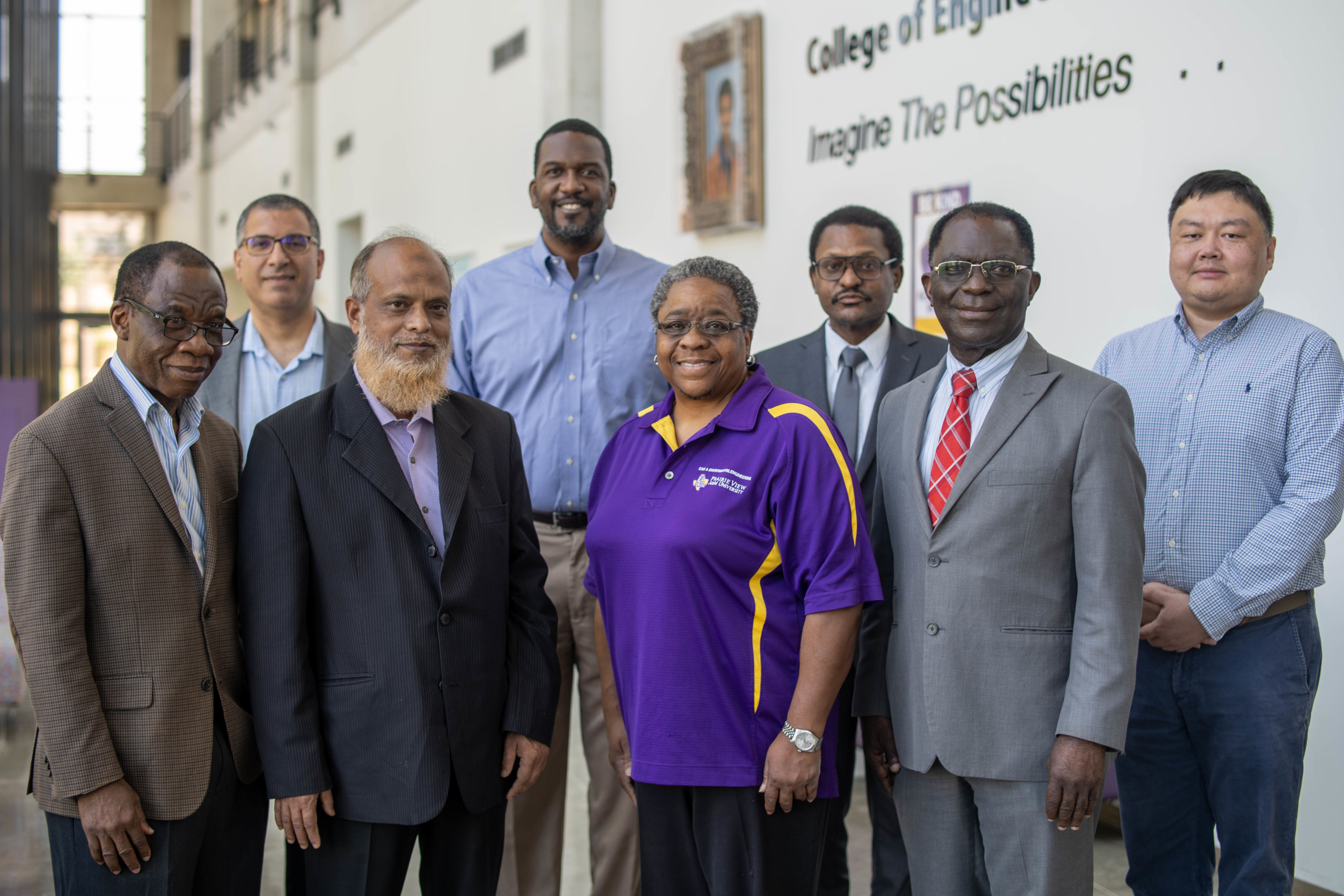
Pictured from left to right: Michael Gyamerah, Abdul Choudhury, Judy Perkins, and Paul Biney; Back row: Sarhan Musa, Lealon Martin, Justin Foreman, and Jaejong Park; Not pictured: Fred A. Bonner II.
PRAIRIE VIEW, Texas (September 15, 2021) – Beginning this October, faculty in Prairie View A&M University’s (PVAMU) Roy G. Perry College of Engineering will implement an innovative new teaching strategy. Called Formatively Assessed Student-Centered Instruction & Active Learning (FASCIAL), the program aims to increase retention and graduation rates among students in science, technology, engineering and mathematics (STEM) disciplines.
“For PVAMU students who have a hard time understanding the core engineering subjects resulting in delayed graduation and below-par GPA at graduation, this project will eliminate the problems associated with the current teaching methods,” said principal investigator on the project, Michael Gyamerah, CEng MIChemE. Gyamerah is a professor at PVAMU and interim head of the Department of Chemical Engineering. “The program should prevent students from failing prerequisite courses, not retaining the information learned in prerequisites, losing interest in courses that are taught using traditional lecture mode and an inability to see the relevance of course material.”
Gyamerah, along with Lealon Martin, Judy Perkins, Abdul Choudhury, Justin Foreman, Sarhan Musa, Paul Biney and Jaejong Park (all faculty members from the College of Engineering), as well as Fred A. Bonner II from PVAMU’s Whitlowe R. Green College of Education, submitted the proposal for FASCIAL to the National Science Foundation (NSF). It was approved in the amount of $1.7 million to be used over the next four years.
“We are excited about the new Formatively Assessed Student-Centered Instruction & Active Learning (FASCIAL) program,” said Dean Pamela Obiomon. “This program will help us to employ new strategies to move the needle on improving retention and graduation rates.”
Even though PVAMU is one of the top three producers of African-American engineers in the country, this new teaching strategy is projected to increase the six-year graduation rate from the current 30% level to a level closer to the national 59% average. “Data will be collected and assessed throughout the program to measure the effectiveness of the FASCIAL strategy,” the team’s proposal stated.
To prepare for this new approach to teaching, the College of Engineering hosted a two-day faculty training workshop over the summer, which was funded by the College and the Provost’s Office through the Faculty Enhancement Program. The workshop introduced faculty to Discipline-Based Educational Research (DBER) and was led by educational research expert Michael Prince, Ph.D.
“(DBER) integrates the deep disciplinary priorities, worldview, knowledge and practices employed by scientists and engineers with complementary research on human learning and cognition,” Gyamerah said.
Workshop topics included:
- Active learning in face-to-face and online settings;
- promoting student-student interactions and managing student teams;
- selecting and assessing learning activities; and
- training faculty and teaching assistants.
“Fifteen courses, covering four engineering disciplines, were selected to be taught using the new FASCIAL strategy,” Gyamerah said.
As part of this new strategy, lectures will be more interactive, and students will work in groups on real-world problems and activities.
The program was approved as part of the NSF’s Improving Undergraduate Stem Education (IUSE) under their Education and Human Resources Program. Nearly 2,000 students at PVAMU are expected to benefit from FASCIAL.
-PVAMU-
